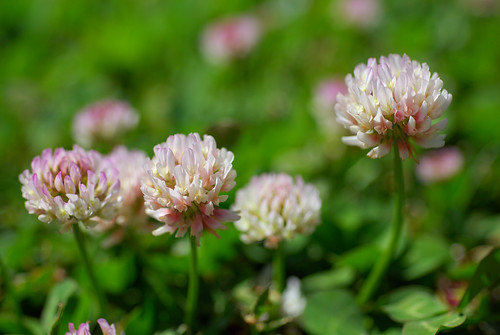Clover: An Indicator of Lawn Health?
Here's an interesting article from the Boston Globe about clover as a socially-accepted component of the suburban lawn way back in the days (like, 1940s way back). However, everything changed when agent orange came along, men landed on the moon and, gosh-darnit, the moon men did not want to set their hoofs upon clover anymore, so, a grateful nation obeyed and clover fell way out of favor.
Actually, it looks like clover is a sign of nitrogen deficiency and an unhealthy lawn. As a nitrogen-fixer - like my beloved peas - clover dwells where no healthy lawn dares tread.




2 comments:
I have to disagree here. I think that Clover makes for a healthier lawn and neighborhood and watershed and river drainage and planet. Clover naturally adds nitrogen to the soil under the surface where surrounding plants and animals are benefited. Whereas, when applying topical fertilizers most of it runs right off the surface the next time you water or it rains, into the storm drains and into your local streams and waterways, leading to fish kills and algal blooms. Plus Clovers are more drought tolerant, staying green though much of the hot, dry summer months when most grass species go dormant. This requires less water use and effort to maintain a green lawn.
Good point. I hear you. I have a good amount of clover in my lawn and so long as I keep it mowed, it doesn't look bad at all and actually seems to crowd out more unappealing weeds. The neatest thing about clover is the pleasing "whizzzzzz" sound it makes as it's cut. It's very distinctive.
What's interesting about this article is that the guy who said that clover was an indicator of an unhealthy lawn is the president of a fertilizer company, albeit an organic one.
So, I guess the real way to look at clover is nature's way of restoring nitrogen to the soil.
Post a Comment